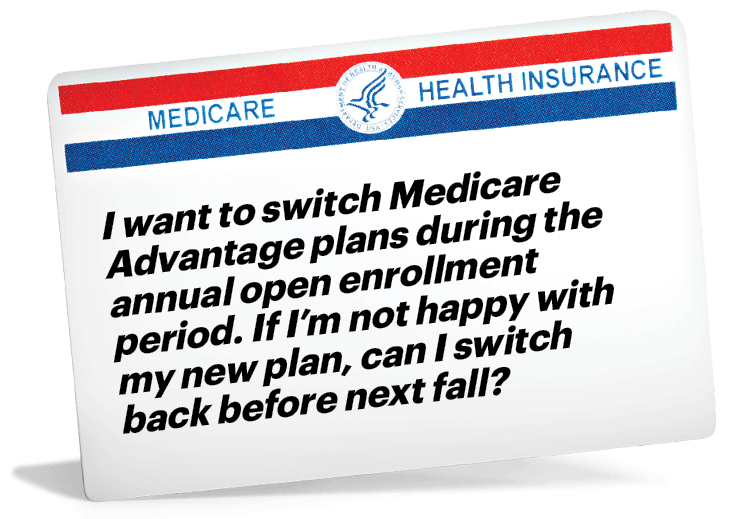Your Money
MEDICARE MADE EASY

People enrolled in MA have additional opportunities to switch plans outside the annual open enrollment period (Oct. 15 to Dec. 7). Each year, the Medicare Advantage open enrollment period runs from Jan. 1 to the last day of March. This is when you can switch plans or drop your MA plan and return to original Medicare. You must already be enrolled in an MA plan to take advantage of this period. If you leave MA and return to original Medicare, you’ll have a chance to join a Part D drug plan at this time. Another opportunity is the five-star special enrollment period. (Five stars is the highest quality rating for Medicare health and drug plans.) You can use this opportunity once a year from Dec. 8 to the following Nov. 30 to switch to one of these top-rated MA plans. The Medicare Plan Finder (medicare.gov/plan-compare) can help you compare plans at any time of the year.
My mother gets help paying for Medicare through a Medicare Savings Program and Extra Help. Will these benefits automatically transfer if she moves in with me? I live in another state.
Because Medicare Savings Programs (MSPs) are run by state Medicaid agencies, eligibility can vary from state to state. Some states have higher income limits and don’t look at assets when determining whether a person qualifies for an MSP. Your mother will need to reapply for an MSP in the new state. The Part D Low-Income Subsidy (Extra Help) is administered by Social Security and Medicare at the national level, and eligibility does not change based on where you live. In most cases, your mother’s benefits should automatically transfer. She will need to inform Social Security about her new address. Your local State Health Insurance Assistance Program (SHIP) at shiphelp.org can offer help if you apply for these benefits.
I just signed up for Medicare in July. Do I really need to change my prescription drug plan during the Oct. 15 to Dec. 7 annual open enrollment period?
Every calendar year, Medicare prescription drug and Medicare Advantage plans can change, and options may be added or removed. This means that premiums, medicines covered and how much you pay out of pocket can all change. During open enrollment, you get to pick from the new plans available. Even if you don’t choose a new plan, your current plan’s costs and coverage may still change as of Jan. 1. Many Medicare enrollees overlook their insurer’s annual notice and do not realize a plan change has occurred until they open their January invoice. If you are in a Medicare Advantage plan, you have until March 31 to switch to another Medicare Advantage plan or return to original Medicare. Unfortunately, people with a stand-alone drug plan must remain in that plan for the remainder of the calendar year. You can get help comparing plans online by using the Medicare Plan Finder, by calling Medicare at 800-633-4227 or by talking to a trusted insurance adviser.
My doctor told me I need to have a colon cancer screening. Does Medicare cover virtual colonoscopies or things like Cologuard in lieu of a traditional colonoscopy?
Medicare covers a range of tests and procedures to screen for colon cancer. A fecal occult blood test is covered once a year. Medicare will also cover a blood-based biomarker screening test and a multitarget stool DNA test (such as Cologuard) once every three years for people ages 45 to 85 who have no signs of, and are at average risk for, colon cancer. Medicare covers conventional colonoscopies once every two to four years (depending on your risk factors) and as a follow-up if you receive a positive result from one of the tests noted above. Medicare covers virtual colonoscopies—which use computed tomography (CT) scanning or magnetic resonance imaging (MRI) to produce two- and three-dimensional images of the colon—only in limited situations, sometimes before an operation or if an obstruction or scarring prohibits use of a conventional colonoscopy.
Send your questions about Medicare to medicare@aarp.org. Due to the volume of inquiries, we can’t answer every question.
MEDICARE HOTLINE:
800-Medicare (800-633-4227)
MEDICARE ONLINE:
medicare.gov